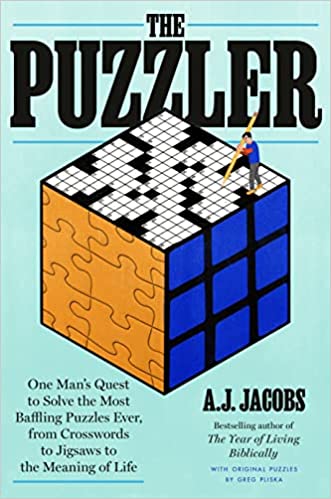On this episode of EconTalk, EconTalk host Russ Roberts hosts guest AJ Jacobs. Jacobs, an exemplar of human curiosity, is an author of four New York Times bestsellers.
Puzzles are the springboard for this conversation between Roberts and Jacobs. The two discuss their mutual fascination for all kinds of puzzles, while also appreciating the metaphors they present for living life. Jacobs explores these ideas and more in his most recent book, The Puzzler: One Man’s Quest to Solve the Most Baffling Puzzles Ever, from Crosswords to Jigsaws to the Meaning of Life.
1- Jacobs and Roberts discuss the human interest in puzzles as they can be both meditative and competitive. Roberts makes the additional point that puzzles offer an opportunity for solace and that they provide for the desire of certainty, whereas in other areas, life is not as simple as Maki Kaji’s question mark–arrow–exclamation point in describing the process of puzzles.
How does reaching certainty in select areas of life bring us a semblance of peace? Which mindset do you prefer when completing a puzzle, competition or meditation, and why?
2- Russ talks about how difficult it is for him to walk away from an unfinished puzzle or a bad series of losses in chess. He makes the claim that chess, especially when playing quick games online, can be reflective of one’s mental state.
How can you develop healthy restraint while attempting to solve a difficult puzzle, or life challenge? What does a healthy balance of relentless discovery and humble restraint look like?
3- Jacobs presents an aphorism which he tries to live by: “don’t get furious, get curious,” which he heard from a child psychologist speaking about handling children’s tantrums during the pandemic. Jacobs and Roberts discuss their mutual disdain for anger as a sensible mindset for approaching anything other than a fight-or-flight response. Jacobs claims that people, when angry, have tunnel vision, and Russ puts the visceral responses brought from anger on trial.
How can learning to deal with frustration improve life? Is Jacobs right in saying that being curious instead of furious is a ‘sanity saving strategy’? Why or why not?
4- Jacobs and Roberts share each of their different favorite types of puzzles, finding common ground for their interest in word-solving exercises. Jacobs also appreciates the meditation found in trying to solve puzzles like jigsaws.
What is your favorite kind of puzzle, and what is it that you like about it? What puzzle or mystery-solving pursuit do you find yourself exerting the most focus or contemplation to?
5- The forward arrow portion of the puzzle-solving process is a focus of the episode, and its nature reflects Jacobs’ thesis for the meaning of life in his book The Puzzler. Jacobs says that people should embrace the forward arrow in life, because we may never reach the exclamation point. For him, the meaning of life is the meaning of searching for it.
What do you make of Jacobs’ forward arrow approach to living life? How does being curious bring you both satisfaction and strength of purpose in life, if at all?
[Editor’s Note: This Extra was originally published on July 28, 2023.]
Brennan Beausir is a student at Wabash College studying Philosophy, Politics, and Economics and is a 2023 Summer Scholar at Liberty Fund.



Comments are closed.